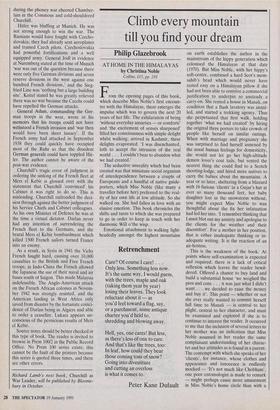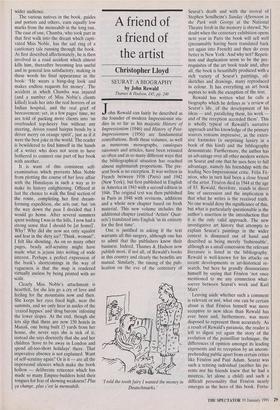Climb every mountain till you find your dream
Philip Glazebrook
AT HOME IN THE HIMALAYAS by Christina Noble Collins, £15, pp. 210 From the opening pages of this book, which describe Miss Noble's first encoun- ter with the Himalayas, there emerges the impulse which was to govern the next 20 years of her life. The exhilaration of being `without everyday anxieties — or comforts' and 'the excitement of senses sharpened' filled her consciousness with simple delight whilst walking; arrived in Kashmir, these delights evaporated. `I was disenchanted, loth to accept the intrusion of the real world . . . I couldn't bear to abandon what we had created.'
The seductive unreality which had been created was that miniature social organism of interdependence between a couple of Europeans and a handful of native guide- porters, which Miss Noble (like many a traveller before her) preferred to the real- ity of her own life at low altitude. So she walked on. She had fallen in love with an elusive emotion. This book chronicles the shifts and turns to which she was prepared to go in order to keep in touch with her daemonic Will o'the wisp.
Emotional attachment to walking light- headedly amongst the highest mountains on earth establishes the author in the mainstream of the hippy generation which colonised the Himalayas at that date (1970). But Miss Noble, with her hippy's soft-centre, combined a hard Scot's mem- sahib's head which would never have rested easy on a Himalayan pillow if she had not been able to contrive a commercial justification to underpin so unsteady a carry-on. She rented a house in Manali, on condition that a flush lavatory was instal- led, and started a trekking agency. Thus she perpetuated that first walk, holding together `what we had created' by hiring the original three porters to take crowds of people like herself on similar outings. When with marriage and pregnancy she was surprised to find herself annexed by the usual human feelings for domesticity, she would not let go her high-altitude demon lover's coat tails, but rented the nearest thing she could find to a Scotch shooting-lodge, and hired more natives to carry the babies about the mountains. A year or so later, sheltering from a blizzard with 16 furious 'clients' in a Gujar's but at ever so many thousand feet, her baby daughter lost in the snowstorm without, you might expect Miss Noble to wax thoughtful about the fix her infatuation had led her into. 'I remember thinking that I must blot out my anxiety and apologise to the clients for the weather and their discomfort'. For a mother in her position, that is either inadequate thinking or in- adequate writing. It is the reaction of an air-hostess.
This is the weakness of the book. At points where self-examination is expected and required, there is a lack of critical reflexion which leaves the reader bewil- dered. Offered a chance to buy land and build a substantial house 'we weighed the pros and cons . . . it was just what I didn't want . . . we decided to raise the money and buy it'. This point — whether or not she ever really wanted to commit herself full time to Manali — is central to her plight, central to her character, and must be examined and explored if she is to continue to interest the reader. It occurred to me that the inclusion of several letters to her mother was an indication that Miss Noble assumed in her reader the same complaisant understanding of her charac- ter and her attitudes as is found in a parent. The contempt with which she speaks of her `clients', for instance, whose clothes and appearance and innocence is endlessly mocked — 'It's not much like Chobham', one poor entomologist is made to remark — might perhaps cause more amusement in Miss Noble's home circle than with a
wider audience.
The various natives in the book, guides and porters and others, earn equally low marks from the memsahib in the long run. The case of one, Chamba, who took part in that first walk into the dream which capti- vated Miss Noble, has the sad ring of a cautionary tale running through the book. At first described affectionately, he is then involved in a road accident which almost kills him, thereafter becoming less useful and in general less satisfactory, making in these words his final appearance in the hook: 'He wears a hang-dog look and makes endless requests for money'. The accident in which Chamba was injured (and a number of Miss Noble's clients killed) leads her into the real horrors of an Indian hospital, and the real grief of bereavement; yet, in a few pages' time, we are told of packing more clients into 'an overloaded top-heavy bus without any steering, driven round hairpin bends by a driver merry on orange spirit', just as if it were the best joke in the world. The reader is bewildered to find himself in the hands of a writer who does not seem to have bothered to connect one part of her book with another.
It is want of this consistent self- examination which prevents Miss Noble from plotting the course of her love affair with the Himalayas in such a way as to make its history enlightening. Offered at last the chance to walk the final section of the route, completing her first dream- forming expedition, she sets out; but 'on the way down the pass I decided that I would go home. After several summers spent wishing I was in the hills, I now had a strong sense that I should be [at home]'. Why? Why did she now see only squalor and fear in the dirty ice? 'Think, woman!', I felt like shouting. As on so many other pages, beady self-scrutiny might have made what is jejune into writing of wide interest. Perhaps a perfect expression of the book's shortcomings in the way of vagueness is that the map is rendered virtually useless by being printed with no scale.
Clearly Miss Noble's attachment is heartfelt, for she lets go a cry of love and feeling for the mountains now and then. She keeps her eyes fixed high, near the summits, and we only hear in asides of the 'crazed hippies' and 'drug barons' infesting the lower slopes. At the end, though she lets slip that there are now 150 hotels in Manali, one being built 15 yards from her house, she never says she is sick of it; instead she says discreetly that she and her children 'have to be away in London and spend all-too-short holidays' there. That imperative absence is not explained. Want of self-scrutiny again? Or is it — are all the impersonal silences which make the book hollow — deliberate reticence which has made so many Empire-builders hold their tongues for fear of showing weakness? Plus ca change, plus c'est la memsahib.



















































 Previous page
Previous page